

Vaccines have been around for a long time and have been saving lives in the UK for decades. They undergo rigorous research, safety testing and monitoring to make sure they are safe for you and your family.
As a parent or carer, you’ll know how easily germs can spread among children and how difficult it can be to avoid this from happening. Vaccination helps provide peace of mind that your child is protected from many serious and potentially deadly diseases.
When you take your child for their vaccines, you’re not only protecting them but you’re also helping to keep other people you care about safe too.
They help stop dangerous diseases from spreading in local communities. So, by keeping up to date with your child’s vaccines, you can also help keep those who are most vulnerable safe, including babies, people living with certain health conditions and older people.
NHS routine childhood vaccinations are free. Staying up to date with your child’s vaccinations throughout their childhood will provide them with the best protection against deadly diseases. Find out which vaccinations your child needs and when below.
It’s okay to have questions about whether vaccination is the right decision for your child.
But it is important to be mindful about where you receive your information from. Anti-vaccine stories and false information can often be spread online through social media or through word of mouth.
Always get your vaccine and health information from trusted sources, such as the NHS or the World Health Organisation (WHO). You can also speak to your GP or health visitor for advice about what vaccines are right for you and your family.
Vaccination information you see on social media may not be based on scientific evidence. All the current evidence tells us that getting vaccinated is safer than not getting vaccinated.


Download our Vaccinations Schedule leaflet, providing a complete list of which vaccinations your child needs and when.
Download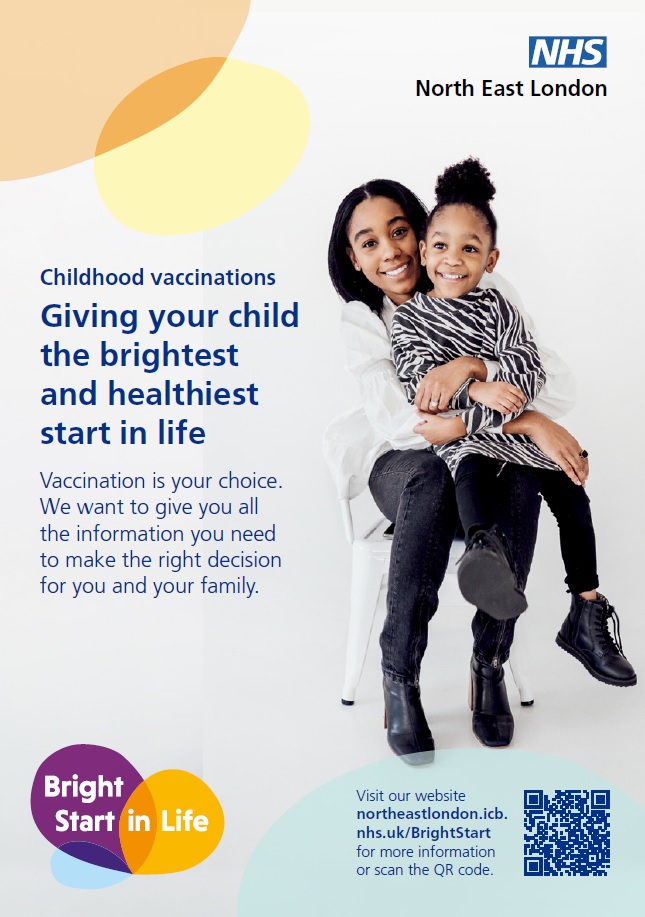
Download our free leaflet for information about childhood vaccinations, why they are important and where to get trusted advice.
Download
Download our free leaflet for information about childhood vaccinations, why they are important and where to get trusted advice.
Download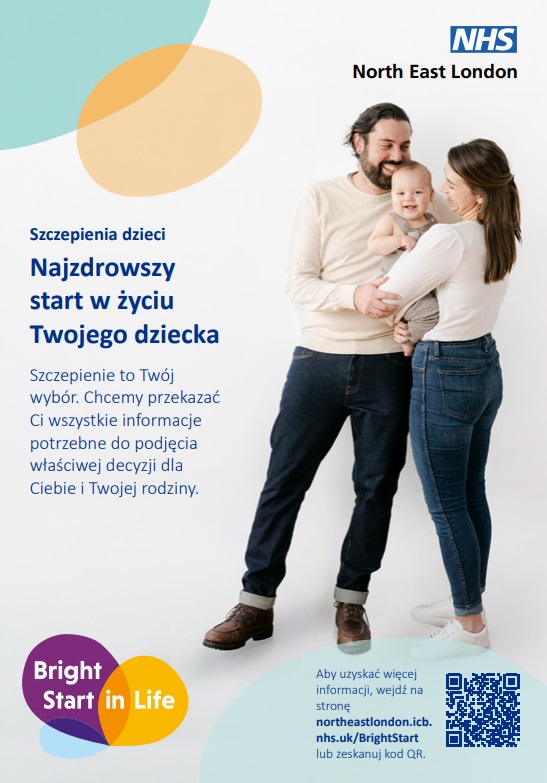
Download our free leaflet for information about childhood vaccinations, why they are important and where to get trusted advice.
Download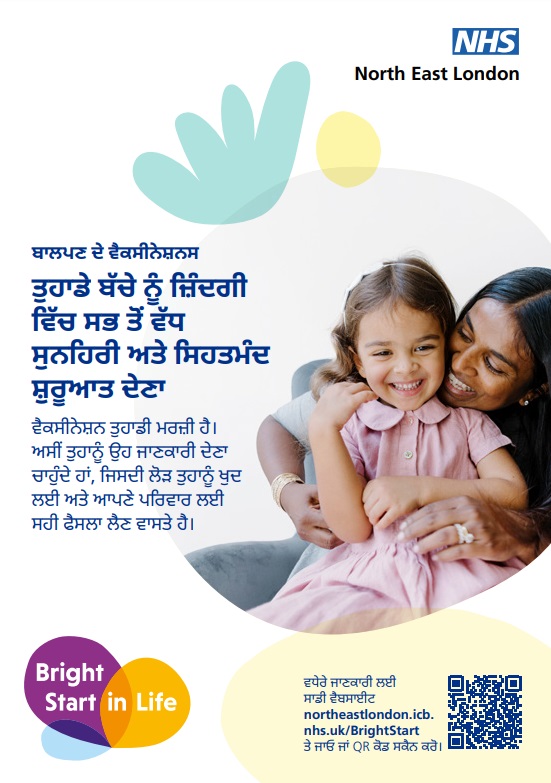
Download our free leaflet for information about childhood vaccinations, why they are important and where to get trusted advice.
Download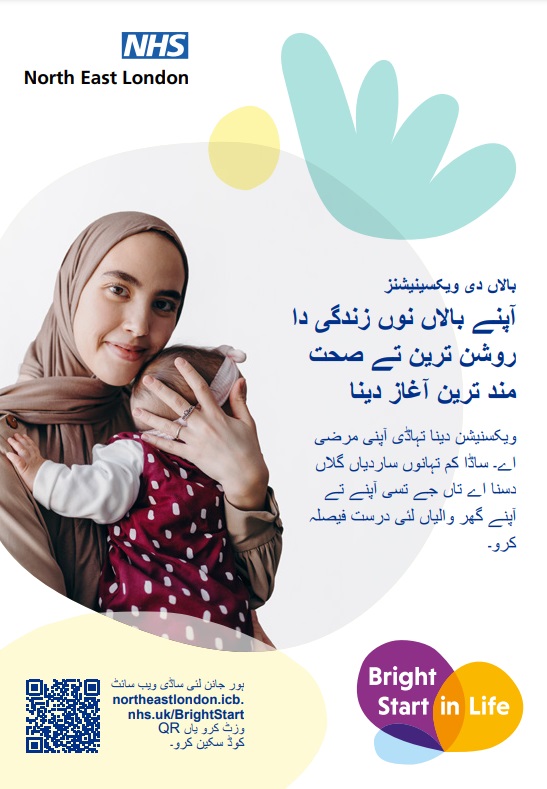
Download our free leaflet for information about childhood vaccinations, why they are important and where to get trusted advice.
Download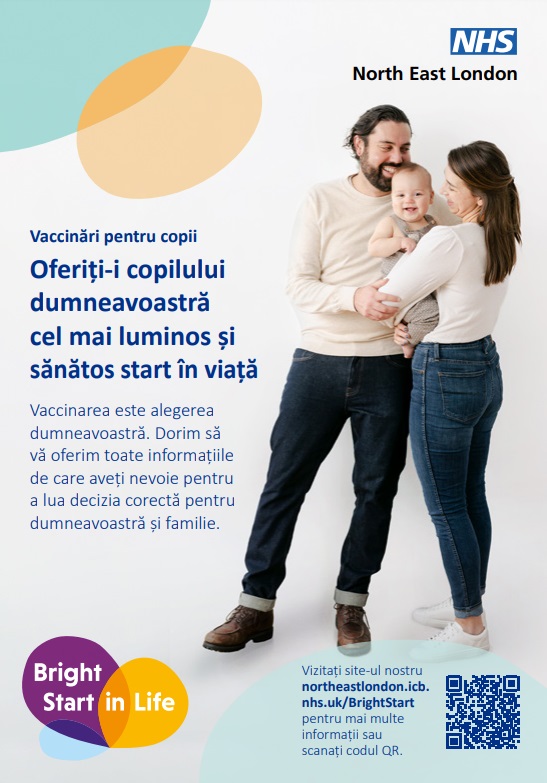
Download our free leaflet for information about childhood vaccinations, why they are important and where to get trusted advice.
Download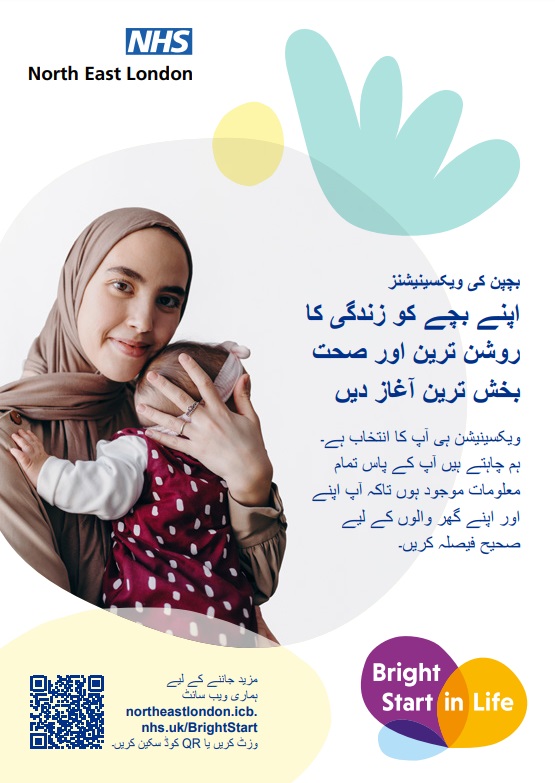
Download our free leaflet for information about childhood vaccinations, why they are important and where to get trusted advice.
Download
If you would like to leave feedback about how useful you found the content on this page, please complete the form below.

| Cookie | Duration | Description |
|---|---|---|
| cookielawinfo-checbox-analytics | 11 months | This cookie is set by GDPR Cookie Consent plugin. The cookie is used to store the user consent for the cookies in the category "Analytics". |
| cookielawinfo-checbox-functional | 11 months | The cookie is set by GDPR cookie consent to record the user consent for the cookies in the category "Functional". |
| cookielawinfo-checbox-others | 11 months | This cookie is set by GDPR Cookie Consent plugin. The cookie is used to store the user consent for the cookies in the category "Other. |
| cookielawinfo-checkbox-advertisement | 1 year | Set by the GDPR Cookie Consent plugin, this cookie records the user consent for the cookies in the "Advertisement" category. |
| cookielawinfo-checkbox-necessary | 11 months | This cookie is set by GDPR Cookie Consent plugin. The cookies is used to store the user consent for the cookies in the category "Necessary". |
| cookielawinfo-checkbox-performance | 11 months | This cookie is set by GDPR Cookie Consent plugin. The cookie is used to store the user consent for the cookies in the category "Performance". |
| CookieLawInfoConsent | 1 year | CookieYes sets this cookie to record the default button state of the corresponding category and the status of CCPA. It works only in coordination with the primary cookie. |
| viewed_cookie_policy | 11 months | The cookie is set by the GDPR Cookie Consent plugin and is used to store whether or not user has consented to the use of cookies. It does not store any personal data. |
| Cookie | Duration | Description |
|---|---|---|
| __cf_bm | 30 minutes | Cloudflare set the cookie to support Cloudflare Bot Management. |
| Cookie | Duration | Description |
|---|---|---|
| _gat | 1 minute | Google Universal Analytics sets this cookie to restrain request rate and thus limit data collection on high-traffic sites. |
| Cookie | Duration | Description |
|---|---|---|
| _ga | 1 year 1 month 4 days | Google Analytics sets this cookie to calculate visitor, session and campaign data and track site usage for the site's analytics report. The cookie stores information anonymously and assigns a randomly generated number to recognise unique visitors. |
| _gat_UA-* | 1 minute | Google Analytics sets this cookie for user behaviour tracking.n |
| _gid | 1 day | Google Analytics sets this cookie to store information on how visitors use a website while also creating an analytics report of the website's performance. Some of the collected data includes the number of visitors, their source, and the pages they visit anonymously. |
| CONSENT | 2 years | YouTube sets this cookie via embedded YouTube videos and registers anonymous statistical data. |
| Cookie | Duration | Description |
|---|---|---|
| test_cookie | 15 minutes | doubleclick.net sets this cookie to determine if the user's browser supports cookies. |
| VISITOR_INFO1_LIVE | 5 months 27 days | YouTube sets this cookie to measure bandwidth, determining whether the user gets the new or old player interface. |
| YSC | session | Youtube sets this cookie to track the views of embedded videos on Youtube pages. |
| yt-remote-connected-devices | never | YouTube sets this cookie to store the user's video preferences using embedded YouTube videos. |
| yt-remote-device-id | never | YouTube sets this cookie to store the user's video preferences using embedded YouTube videos. |
| yt.innertube::nextId | never | YouTube sets this cookie to register a unique ID to store data on what videos from YouTube the user has seen. |
| yt.innertube::requests | never | YouTube sets this cookie to register a unique ID to store data on what videos from YouTube the user has seen. |
The BCG (Bacillus Calmette-Guérin) vaccine helps protect children against tuberculosis (TB).
In north east London – except for Newham – the BCG vaccine is only recommended for children at higher risk of getting tuberculosis (TB), including children who have a parent or grandparent from a country with high rates of TB.
Your health visitor, midwife, local hospital or health centre will be able to advise if it’s recommended that your baby have the BCG vaccine.
For young children, you can speak to your GP if you think your child might need their BCG vaccine.
In Newham the BCG vaccine is given to all babies, as there are higher rates of TB in the borough. The BCG vaccine is usually offered within the first 28 days of birth.
You will receive a letter, text or phone call asking you to book an appointment for your baby’s BCG vaccine. It’s important you get in touch if you haven’t received an offer from them in the first 28 days of your child’s birth.
Call 0208 214 1395 or email newham.bcg@nhs.net
If you live in Newham visit www.newham.gov.uk/children-families/childhood-immunisations/2
The 6-in-1 vaccine helps protect babies against serious illnesses including polio, hepatitis B, whooping cough, diphtheria, Hib (Haemophilus influenzae type b) and tetanus.
Illnesses such as whooping cough in babies under 6 months can lead to more serious problems, such as breathing difficulties and pneumonia.
The 6-in-1 vaccine is given in 3 doses, at 8 weeks old, 12 weeks old and 16 weeks old. It’s important your baby receives all their 6-in-1 vaccine doses, to help give them the best protection from illnesses as they grow up.
Please contact your GP practice if you think your baby has missed their 6-in-1 vaccine or to talk about any concerns or questions you may have.
Rotavirus is a common infection that can spread very quickly. It’s very common in babies and young children.
Rotavirus can cause vomiting and diarrhoea which can lead to some children needing hospital treatment due to dehydration.
Babies are given 2 doses of the rotavirus vaccine, firstly at 8 weeks old, then at 12 weeks old.
If your baby has missed their rotavirus vaccine, contact your GP surgery to make sure your child is protected. You can also talk through any concerns or questions you may have about the rotavirus vaccine with your GP.
The MenB vaccine can help protect your baby from serious illnesses like meningitis and sepsis, which can be life threatening.
These infections are caused by meningococcal group B bacteria.
The MenB vaccine is given in three doses, firstly when they’re 8 weeks, 16 weeks and at 1 year old.
The vaccine is safe to be given with other routine baby vaccinations.
Keeping your baby up to date with their MenB vaccines can help give them the best protection against serious illness.
If your baby isn’t up to date with all their doses you can make an appointment with your GP to make sure they receive all their MenB vaccines.
If you have any questions about the MenB vaccination, please contact your GP.
The pneumococcal vaccine helps to provide protection against bacterial infections such as sepsis, meningitis, and pneumonia. It’s offered to those who are most vulnerable to these illnesses including babies.
The first dose is given at 12 weeks and a booster dose is later provided at 1 year old.
Making sure your baby has had the pneumococcal vaccine can help to keep your baby safe from serious illness.
You can contact your GP surgery if your child has missed their pneumococcal vaccine.
The Hib / MenC vaccine helps protect babies against haemophilus influenzae type b (Hib) and meningitis C.
These infections can be serious and life-threatening so it’s important to make sure that your child is protected.
The Hib / MenC vaccine is given to 1 year old babies, this is after they have had 3 doses of the 6-in-1 vaccine.
If your child has missed their Hib / MenC vaccine, you can contact your GP surgery who can talk with you about any questions you may have.
The MMR vaccine can help give your child the best protection against measles, mumps and rubella.
Watch a video about the MMR vaccine.
Measles can be a lot more serious than just having a rash and it can lead to some children needing hospital treatment.
The MMR vaccine is given in two doses, at 1 year old and then at 3 years and 4 months old.
Making sure your child is up to date with their MMR vaccines is the best way to keep them safe from becoming seriously unwell.
There have been many studies that have looked into whether the MMR vaccine increases the risk of a child developing autism. Research studies have found no evidence linking the MMR vaccine and developing autism
In the UK, we have two MMR vaccines which work very well. One of them contains pork gelatine and the other one doesn’t. If you would prefer to have the vaccine that doesn’t contain pork gelatine, you can mention this when you book an appointment.
The children’s flu vaccine can help protect your child against flu and help stop serious illness, such as pneumonia developing.
The flu vaccine is offered free every year in autumn or early winter as the virus changes every year.
The flu vaccine is offered to children aged 2-3 years old and is given at their GP surgery.
School-aged children from reception through to year 11 will also be offered a flu vaccine at school.
Most children can receive their flu vaccine by a simple and painless nasal spray.
The nasal spray vaccine contains a small amount of pork gelatine. However, many faith organisations deem it to be acceptable, partly because it’s a non-oral product.
A flu vaccine alternative can be given that doesn’t contain pork gelatine.
Speak to the person vaccinating your child about this or request the flu injection on your child’s consent form.
The 4-in-1 pre-school booster can help protect against serious illnesses: tetanus, whooping cough, diphtheria and polio.
It helps to boost the protection provided by the 6-in-1 vaccine given to babies.
The 4-in-1 vaccine is given before the child starts school as one single dose at aged 3 years and 4 months old.
If your child has missed their 4-in-1 pre-school booster or if you have any questions or concerns, you can contact your GP practice.
The HPV vaccine can help protect against human papillomavirus (HPV).
HPV is a common virus that can be spread through skin contact. This means it can be spread when having sex.
The protection the vaccine provides is better when it’s given before a person becomes sexually active.
Some types of HPV are linked to a higher risk of developing certain types of cancer, such as cervical cancer.
This vaccine is recommended for children aged 12 – 13 years old and is provided at secondary school or at community clinics if your child doesn’t attend school.
To help make sure your child receives their HPV vaccine, please respond to the request for consent as soon as possible.
The 3-in-1 teenage booster can help boost protection against three illnesses: polio, diphtheria and tetanus.
It’s free for all young people aged 14 and is given as a single dose at secondary school (school year 9).
Schools will invite those eligible for their 3-in-1 vaccine.
Please respond to the request for consent as soon as possible
The MenACWY vaccine can help protect young people from 4 different strains of the meningococcal bacteria – A, C, W and Y.
These can cause meningitis and sepsis which can be life threatening.
Children aged 13-14 are offered this vaccine at secondary school and it’s given as a single dose.
If your child is starting college or university, it’s important that they have had this vaccine as infection can spread more easily in these environments.
Please respond to the request for consent as soon as possible to make sure your child has their vaccine on time and stays protected.
If your child has missed their MenACWY vaccine, or if you have any questions, please contact your GP.

